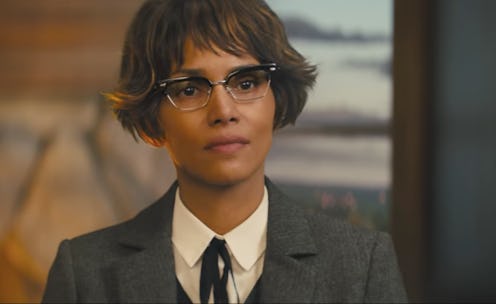Entertainment
This 'Kingsman 2' Scene Expertly Nails What Being A WOC The Work Place Is Really Like

Kingsman: The Golden Circle is an action-packed good time romp... for men. For women, both on screen and off, it's a very different story, and one particular Halle Berry scene in Kingsman 2 makes that abundantly clear. The scene nails what it's like to be a woman in a male-dominated world, and it especially nails what it's like to be a woman of color in a male-dominated world. We've all been in the same position that Berry's character Ginger Ale is placed in the film, and we all wish that we could have handled it the same way that she does without any consequences.
Spoilers ahead! Near the end of the movie, the day is saved and a Statesman has fallen, leaving a seat open at the top of the organization. Statesman head Champagne (aka "Champ") congratulates Harry and Eggsy on a job well done while Ginger Ale stands beside the duo. In an earlier conversation with Merlin, Ginger Ale had revealed that she'd always wanted to be a Statesman field agent, but, every time there was an opening, Whiskey (Pedro Pascal) would vote against her, leaving her in her role as tech support.
Now that there's another open position, and you can practically see the hope in Ginger Ale's eyes as Champ brings this up. But... he offers the seat to Harry and Eggsy, whichever one of them wants to stay and be a Statesman. I repeat: instead of giving the job to the highly qualified woman who has not only applied several times, but been vouched for by every other Statesman except for Whiskey each time, Champ offers the promotion to either one of new, white men. Neither Harry nor Eggsy had even heard of the Statesmen before the Kingsman organization was blown up, and this was their first mission alongside the Statesmen, and yet they are offered positions at the top of the organization before Ginger Ale, who has been working toward that advancement for years.
For women, this feeling of being overlooked is all too real, but for women of color, it's even more painful. According to a 2016 study by LeanIn.Org and McKinsey & Co., women of color are the "most underrepresented" group in senior and upper ranks of companies. Only 12 percent of first-level managers were women of color compared to 45 percent of white men in 2016; this is despite 48 percent of women of color surveyed saying they aspired to be a top level executive, compared to 37 percent of white women. In the words of Annalisa Adams-Qualtiere, a human resources leader and contributing writer to Forbes HR Council, "When I hear ‘glass ceiling,’ I think that’s great, you can break through glass. When it is concrete, you need a door and there need to be people on the other side of that door."
In Ginger Ale's case, there appears to be no one on the other side of that door who wants to let her in. This is despite the fact that, unlike Kingsman, Statesman has two black men on their council (though the characters have no lines and only appear as holograms). So in that scene when Champ offers Harry and Eggsy the job, she has to step forward, she has to point out that she would like the position, and she has to point out that she is qualified for it. Champ looks taken aback by her candor, but puts it to a council vote which goes unanimously in Ginger Ale's favor. Pleased and proud, she takes the seat at the table that Eggsy pulls out for her, and that's the end of that.
But, in the real world, it's hardly ever that easy for black men and women to speak out for themselves without fearing consequences. As The Atlantic's Adia Harvey Wingfield wrote in 2015 after studying black professional workers across numerous occupations, those employees felt that they had to take care to only show "feelings of conviviality and pleasantness" rather than express any "emotions of anger, frustration, and annoyance," the latter of which they felt were discouraged when coming from them in particular. And for black women in particular, being outspoken, like Ginger Ale was in that meeting when arguing for her job, is often mistaken as an act of aggression.
Eternity Martis wrote in "The Politics of Being Black and Loud" for Fader that society has perpetuated the mistreatment of black women "because of a public perception that black people — women in particular — are inherently obnoxious, confrontational, verbally abusive, and loud." And that perception can get black women kicked out of public spaces or fired from their jobs, when it isn't forming part of the concrete ceiling that keeps them from advancing up the ladder.
So while it's nice to imagine a world in which simply pointing out that you're the most qualified person in a room is enough to get you your dream job, what Ginger Ale does in Kingsman 2 is an idealized situation. In real life, black women are more familiar with the reality in which they say nothing at all when overlooked, or, when they do speak up, a white person gets promoted or brought in over them and they sometimes get in trouble for daring to speak out anyway.
The overall message of Kingsman 2 is about drugs and public perception, but it's Ginger Ale's arc that provides the most compelling and political statement of the film. And it all comes down to this single scene, where she has to demand what is given to white men so easily. It's a perfect summary of every single day in the life of black women, but in this case, Ginger Ale gets the ideal happy ending that we usually don't.